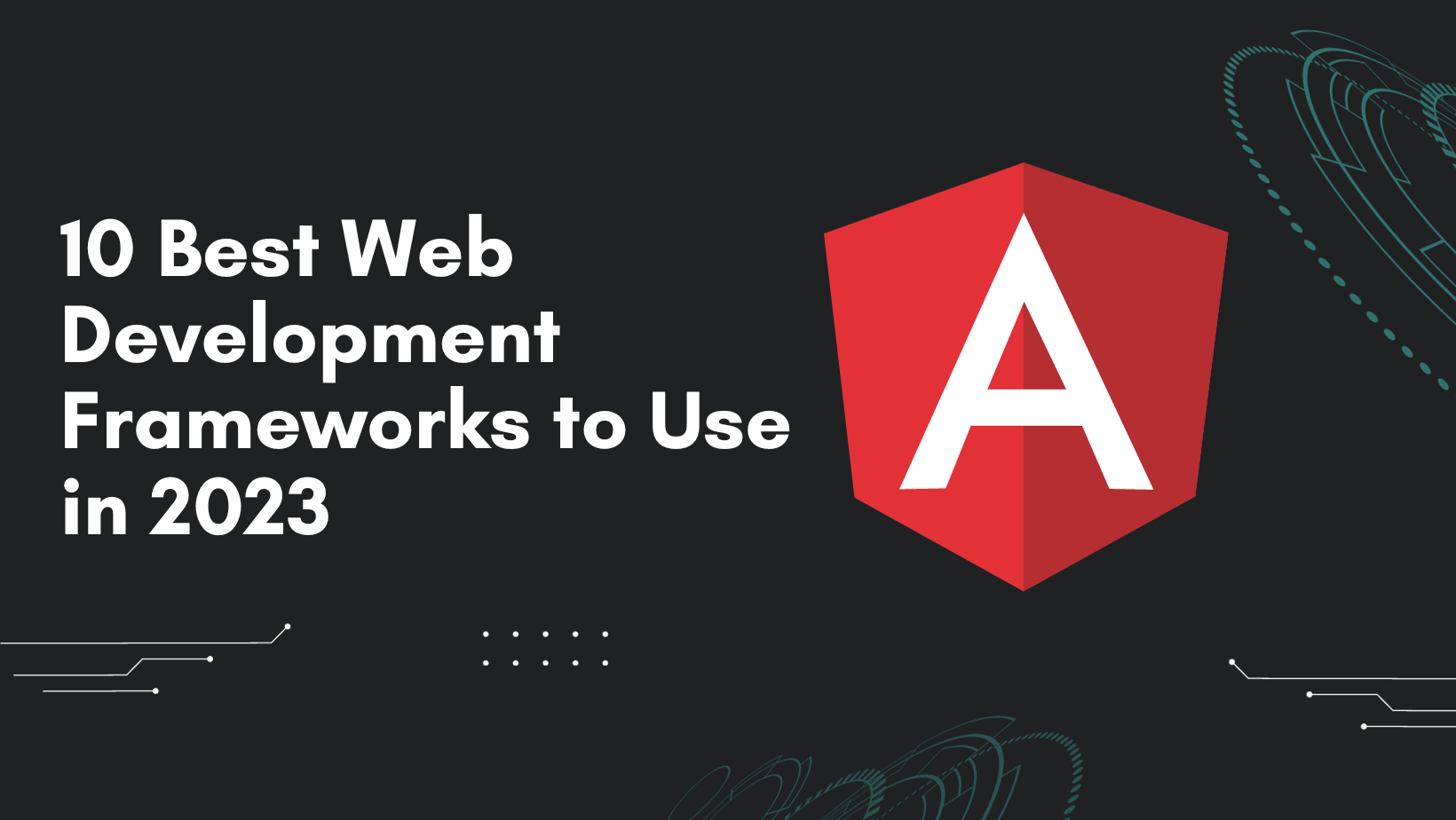In the ever-evolving world of web development, staying up-to-date with the latest tools and technologies is crucial to create cutting-edge websites and web applications. Web development frameworks are instrumental in simplifying the development process, enhancing productivity, and ensuring that your web projects are robust and scalable. If you’re a web developer or someone looking to hire web development services, this article will guide you through the 10 best web development frameworks to use in 2023.
What are Web Development Frameworks?
Before diving into our list, let’s clarify what web development frameworks are. These are pre-built structures, libraries, and standardized coding practices that streamline the process of building websites and web applications. They provide developers with a foundation to work on, eliminating the need to reinvent the wheel for common web development tasks.
The Importance of Choosing the Right Framework
Selecting the right web development framework is a crucial decision, as it can significantly impact the efficiency, scalability, and performance of your web project. The right framework will save you time and effort, while the wrong one can lead to a host of challenges.
Top 10 Web Development Frameworks for 2023
4.1. Angular
Angular is a powerful and widely-used front-end framework by Google. It’s known for its robust architecture, making it an excellent choice for creating dynamic and data-intensive web applications.
Angular provides a comprehensive set of tools for creating web applications, including powerful features for routing, forms, and state management.
Its mature ecosystem boasts a vast community and abundant resources, making it easier to find help and documentation.
Angular’s consistent updates and long-term support ensure that your web applications remain secure and up-to-date.
4.2. React
React is renowned for its component-based architecture, which promotes reusability and modularity in web development.
Its virtual DOM enables efficient rendering, resulting in faster and smoother user interfaces.
React Native, a framework derived from React, allows developers to create mobile apps for both iOS and Android using the same codebase.
4.3. Vue.js
Vue.js is a progressive front-end framework that’s gaining popularity rapidly. It offers an easy learning curve and great flexibility, making it suitable for projects of all sizes.
Vue.js is known for its progressive nature, allowing developers to adopt it incrementally in their projects, making it an excellent choice for gradual upgrades.
Its official state management library, Vuex, simplifies handling complex application states.
Vue 3 introduced Composition API, which provides more flexibility and control in component composition.
4.4. Ruby on Rails
Ruby on Rails is a web application framework known for its simplicity and productivity. It’s a great choice for startups and small businesses.
Ruby on Rails follows the “Convention over Configuration” principle, reducing the need for decision-making in project setup and structure.
It emphasizes developer happiness, focusing on making programming joyful and efficient.
Rails’ vast library of gems simplifies adding various functionalities to your applications.
4.5. Django
Django is a high-level Python web framework that encourages rapid development and clean, pragmatic design. It’s favored for its simplicity and versatility.
Django’s “batteries-included” philosophy includes many features like authentication, an admin panel, and ORM, which accelerates project development.
It’s highly secure and follows best practices for web security, making it a great choice for applications that handle sensitive data.
Django’s Django REST framework facilitates API development, enabling you to create robust and scalable APIs.
4.6. Laravel
Laravel is a PHP framework that excels in elegant syntax and a wide array of features, making it perfect for building modern web applications.
Laravel’s elegant syntax and features like Eloquent ORM and Blade templating engine enhance the development experience. Laravel Spark provides a foundation for SaaS application development, including subscription billing and team management features.
Laravel’s strong community and Laracasts platform offer excellent resources for learning and support.
4.7. Express.js
Express.js is minimal and unopinionated, giving developers more freedom to structure their applications as they see fit.
Its middleware system allows you to easily add various functionalities, such as authentication and logging, to your web applications. Express.js is particularly popular for building RESTful APIs.
4.8. Spring Boot
Spring Boot is an excellent choice for Java developers. It simplifies Java application development and offers a robust ecosystem.
Spring Boot simplifies the setup and configuration of Spring applications, reducing the time spent on boilerplate code. It offers a wide range of modules for different functionalities, such as Spring Data for database access and Spring Security for authentication and authorization.
Spring Boot’s strong integration with the Spring ecosystem ensures compatibility with various Spring projects.
4.9. ASP.NET Core
ASP.NET Core is Microsoft’s open-source, cross-platform framework for building modern, cloud-based, and internet-connected applications.
ASP.NET Core is cross-platform, allowing developers to build web applications that run on Windows, Linux, and macOS. It’s highly performant and scales well, making it suitable for high-traffic websites and web applications. ASP.NET Core’s integration with Azure and other cloud services simplifies cloud deployment.
4.10. Flask
Flask is a lightweight Python web framework that’s known for its simplicity and ease of use. It’s ideal for small to medium-sized projects.
Flask’s minimalistic approach provides developers with a lightweight framework that’s easy to understand and extend. It’s an excellent choice for building small to medium-sized web applications and APIs. Flask’s simplicity makes it a great starting point for Python developers looking to enter the world of web development.
Factors to Consider When Selecting a Framework
When choosing a web development framework, consider factors like your project requirements, the size of your team, and your familiarity with the programming language. Each framework has its own strengths and weaknesses, so make an informed decision.
Pros and Cons of Using Web Development Frameworks
Pros:
- Faster development
- Improved security
- Scalability
- Community support
Cons:
- Learning curve
- Framework-specific limitations
The Future of Web Development Frameworks
Web development frameworks will continue to evolve, adapting to the ever-changing landscape of technology. It’s essential to keep an eye on emerging trends and updates within the development community to ensure that your projects remain cutting-edge.
Conclusion
In 2023, web developers have an array of fantastic frameworks to choose from, each with its unique strengths. The best web development framework for your project depends on your specific needs, team, and expertise. By staying informed about the latest developments in the field and choosing the right framework, you can build exceptional web applications and stay ahead of the curve.
FAQs
1. Can I use multiple web development frameworks in a single project?
- Yes, it’s possible, but it can complicate the development process. It’s advisable to stick to one framework for a smoother workflow.
2. What is the primary difference between a framework and a library in web development?
- A framework provides a structure for building an entire application, while a library offers pre-written code for specific functions or tasks.
3. Are web development frameworks suitable for small projects?
- Yes, many frameworks are scalable and can be used for projects of various sizes, including small ones.
4. How often should I update my chosen web development framework?
- It’s recommended to stay updated with the latest releases and security patches to ensure the best performance and security for your web project.
5. Do I need to be an experienced developer to use these frameworks?
- No, many frameworks cater to developers of all skill levels, from beginners to experts. Choose one that matches your expertise.



